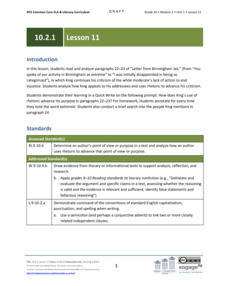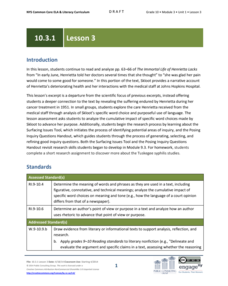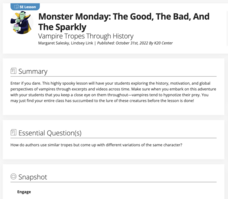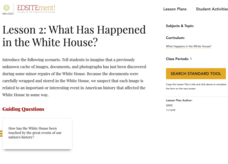Clackamas Community College
Towards an Open Anthology of Poetry
Towards an Open Anthology of Poetry features poets talking about their work, poems by topic, terms to use when teaching poetry, and poems to use for close reading.
EngageNY
Grade 10 ELA Module 2: Unit 1, Lesson 11
Choose your words carefully. Martin Luther King Jr. carefully chooses his words to provide evidence to support his claim about segregation. Scholars work in pairs to discuss previous lessons, complete homework assignments, determine the...
EngageNY
Grade 10 ELA Module 2: Unit 1, Lesson 17
Scholars read the final paragraphs written by Martin Luther King Jr. in "Letter from Birmingham Jail." Readers work in groups to discuss King's word choice and point of view by completing graphic organizers. They also respond to a...
EngageNY
Grade 10 ELA Module 3: Unit 1, Lesson 3
Choose your words wisely. Scholars examine word choice in an excerpt from The Immortal Life of Henrietta Lacks. Learners work in pairs and groups to discuss how the author's choice of words creates a deeper connection between the reader...
EngageNY
Grade 10 ELA Module 3: Unit 1, Lesson 1
Can people live forever? Scholars ponder the answer as they analyze an excerpt from The Immortal Life of Henrietta Lacks. As readers discover Lacks' immortal cells, they discuss how the author carefully sequences, connects and unfolds...
EngageNY
Grade 10 ELA Module 4: Unit 2, Lesson 15
What goes around, comes around. Using the resource, pupils read Act 4.3 of Macbeth, in which Macduff and Malcolm plan to attack Macbeth. Scholars then hold a discussion and complete writing activities to analyze Shakespeare's structural...
EngageNY
Grade 11 ELA Module 2: Unit 1, Lesson 19
Scholars look at paragraphs two and three in the "Atlanta Compromise" speech. They analyze how Washington uses a story about a ship lost at sea and rhetorical devices to develop his point of view. After class discussion and completing...
EngageNY
Why Did Douglass Write the Narrative?
Readers take another look at Narrative of the Life of Frederick
Douglass to determine the purpose of the text. They use Frederick Douglass’s Purpose: Text and Questions handout and a close reading guide to direct their thinking. To...
EngageNY
Finding Evidence of Carl Hiaasen’s Perspective in Flush
Mix and mingle. Scholars travel around the room to music stopping to meet with a classmate when the music stops. They answer questions about Flush at each stop. Learners then work together to identify the evidence they used to determine...
Digital Public Library of America
African American Soldiers in World War I
Finding good primary source materials to support any study of history can be a challenge and time-consuming. A set of 11 primary source letters, images, and text excerpts provide young historians with an opportunity to sharpen their...
National Endowment for the Humanities
Dostoevsky's Crime and Punishment
Pain and suffering do not have to be inevitable in a study of Crime and Punishment. A carefully scaffolded lesson plan introduces readers to the divided natures of the characters in Fyodor Dostoevsky's complex novel. Groups use...
Facing History and Ourselves
Finding Your Voice
To begin a study of what it means to be American, high schoolers first consider their own identities. They draw a picture of what they think an American looks like and share their images. Next, they examine an image of the "Flag of...
K20 LEARN
The K20 Chronicle, Lesson 1: What Makes a Good Article?
Good news articles are engaging, informative, and often compelling. In the first lesson of the four-part series, young journalists analyze and evaluate news stories about former NBA player Enes Kanter Freedom. They learn about the...
K20 LEARN
Monster Monday - The Good, the Bad, and the Sparkly: Vampire Tropes through History
Fangs, capes, pale skin, and beady eyes! High schoolers investigate the tropes associated with vampires by examining excerpts from stories and films. They then create a timeline that reveals how the depictions of vampires have evolved...
J. Paul Getty Trust
Exhibiting Common Threads
Artists working in different media often explore the same themes—to model how these same themes weave their way through different forms of artistic expression, scholars analyze images by Dorothea Lange, identifying key themes in her...
National Endowment for the Humanities
Kate Chopin's The Awakening: Local Color in the Late 19th Century
Kate Chopin's The Awakening introduces readers not only to the lush Louisiana setting of Grand isle but also to the nuances of Creole culture. the second lesson in a three-part series examines how Chopin's use of literary realism and...
National Endowment for the Humanities
Lesson 2: What Has Happened in the White House?
Working in small groups, or individually, learners are given images of events that took place at the White House. They study the image and research that time in history to better understand how the White House has been affected by...
National Endowment for the Humanities
How "Grand" and "Allied" Was the Grand Alliance?
Learn more about the Grand Alliance with a scaffolded lesson plan that includes four activities. Class members use primary sources to complete a map exercise, understand the goals and objectives of each individual nation, and participate...
National Endowment for the Humanities
Victory and the New Order in Europe
A New Order in Europe calls for a new lesson plan! This third plan in a series of four sequential lessons encourages high schoolers to read primary sources about the development of the New Order and follow up their knowledge with a...
National Endowment for the Humanities
Ending the War, 1783
The various peace proposals, made by both sides, to end the Revolutionary War come under scrutiny in this final lesson of a three-part series on the war. Class members read primary source documents and compare them with military...
J. Paul Getty Trust
Still-Life Painting: Arranging Nature—Lesson 1
Art learners examine still-life arrangement images and respond to a series of prompts. In a whole-class discussion, pupils list elements and qualities that still-life paintings can have. After instructors create an arrangement and model...
Middle Tennessee State University
Preparing for Revolution
Class members create a timeline of actions by both the British parliament and the colonists that led to the outbreak of the American Revolution. Groups use the provided Primary Source Analysis Tool to examine and...
Middle Tennessee State University
A House Divided: The Civil War Home Front in Tennessee
To broaden their understanding of both the short term and long terms effects of the Civil War, class groups examine primary source materials and then assume the role of a family member and draft a letter to a soldier describing life at...
Curated OER
Individuality vs. Conformity
Spark an animated debate in your class! Young adults consider some of the fads or trends that are prevalent at their school, as well as their own level of participation in them. Just how much of a role does popular culture play in their...
Other popular searches
- Author's Purpose to Inform
- Authors Purpose to Entertain
- Georgia Authors to Study
- Critical Response to Authors
- Author's Purpose to Persuade
- Author Want to Convey
- Writing a Letter to an Author
- Authors Purpose to Inform
- Authors Purpose to Criticize
- Letter to Author
- Letter Writing to an Author
- Friendly Letter to Author

























